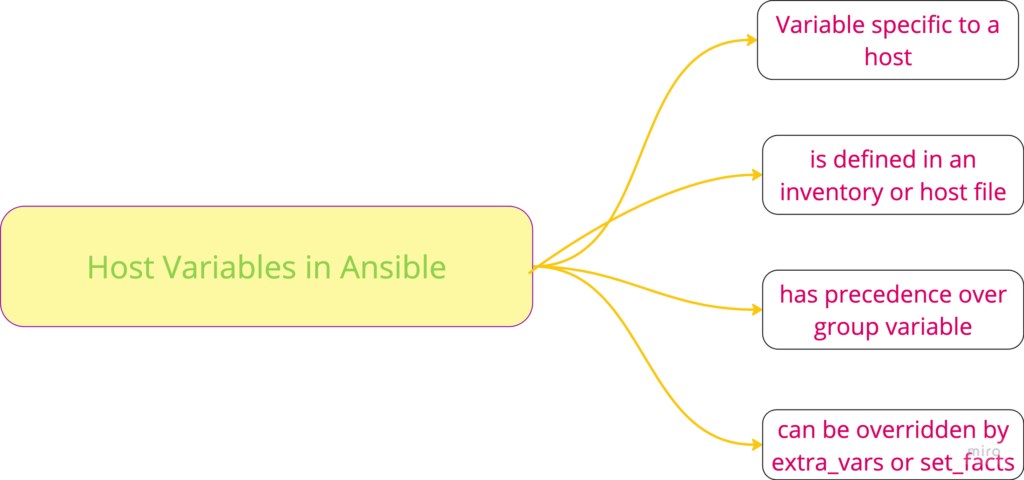What are host variables?
Host variables in Ansible are variables that are associated with individual hosts, typically defined in the inventory file or in separate variable files within a host_vars directory. These variables are used to specify information that is unique to each host, such as IP addresses, domain names, or any other host-specific configurations.
You can go through Group Variables in Ansible first to get a better understanding of variables.

Major steps in using host variables in Ansible
- Defining Host Variables in Inventory File: You can define host variables directly in the inventory file. For example:
[webserver]
host1.example.com http_port=80 max_clients=200
In the example above, http_port and max_clients are host variables for host1.example.com.
- Using the
host_varsDirectory: Ansible allows you to create a directory namedhost_varsat the same level as your inventory file. Inside this directory, you can create YAML files named after each host.
For instance, you could have a file named host1.example.com.yml with the following content:
---
http_port: 80
max_clients: 200
Accessing Host Variables in Playbooks: In your playbooks, you can access these variables using the standard Jinja2 templating system:
- name: Configure web server
hosts: webserver
tasks:
- name: Set http port
template:
src: templates/src.conf.j2
dest: /etc/src.conf
vars:
port: "{{ http_port }}"
In the task above, http_port is used to template out a configuration file with the correct port.
Dynamic Host Variables with set_fact: You can also set host variables dynamically during playbook execution using the set_fact module:
- name: Set dynamic variable
hosts: webserver
tasks:
- name: Set custom http port
set_fact:
http_port: 8080
After this task runs, the http_port variable will be set to 8080 for the host in the context of the current playbook run.
Overriding host variables with extra_vars
In Ansible, extra_vars has the highest precedence, it can override host_vars. E.g
ansible-playbook site.yml -e “http_port=8081”
this will override 8080 with 8090
host_vars precedence order is as below (lowest to highest)
- host variables
- host_vars overridden by set_facts
- host_vars orerridden by extra_vars.
Best Practices: It is considered a best practice to keep host-specific variables in host_vars to keep the inventory file clean and manageable.
Frequently Asked Questions
- What are host variables in Ansible?
- Host variables are variables associated with individual hosts or groups in an Ansible inventory file. They allow you to define specific attributes or configurations for different hosts or groups.
- How are host variables defined in Ansible?
- Host variables can be defined directly in the Ansible inventory file or in separate variable files. In the inventory file, host variables are typically defined under the host’s entry using YAML syntax.
- What are some common use cases for host variables?
- Host variables commonly define host-specific configurations such as IP addresses, ports, SSH keys, environment variables, and application-specific settings. They provide a flexible way to customize configurations for different hosts or groups.
- Can host variables be overridden or inherited?
- Yes, host variables can be overridden or inherited in Ansible. If a variable is defined at both the host and group level, the host-level variable takes precedence. Host variables can also be inherited from parent groups if not explicitly defined for a specific host.
- How can I access host variables in Ansible playbooks?
- Host variables can be accessed within Ansible playbooks using Jinja2 templating syntax. For example, you can reference a host variable using
{{ hostvars['hostname']['variable_name'] }}syntax within tasks or templates to access the value of the variable for a specific host.
- Host variables can be accessed within Ansible playbooks using Jinja2 templating syntax. For example, you can reference a host variable using
Conclusion
In this post, you learned about host_vars and how to use them. You also learned about best practices related to host variables in Ansible.
Using host variables in Ansible effectively can make Ansible configurations more flexible and easier to maintain, especially in environments where each host requires its specific configurations.